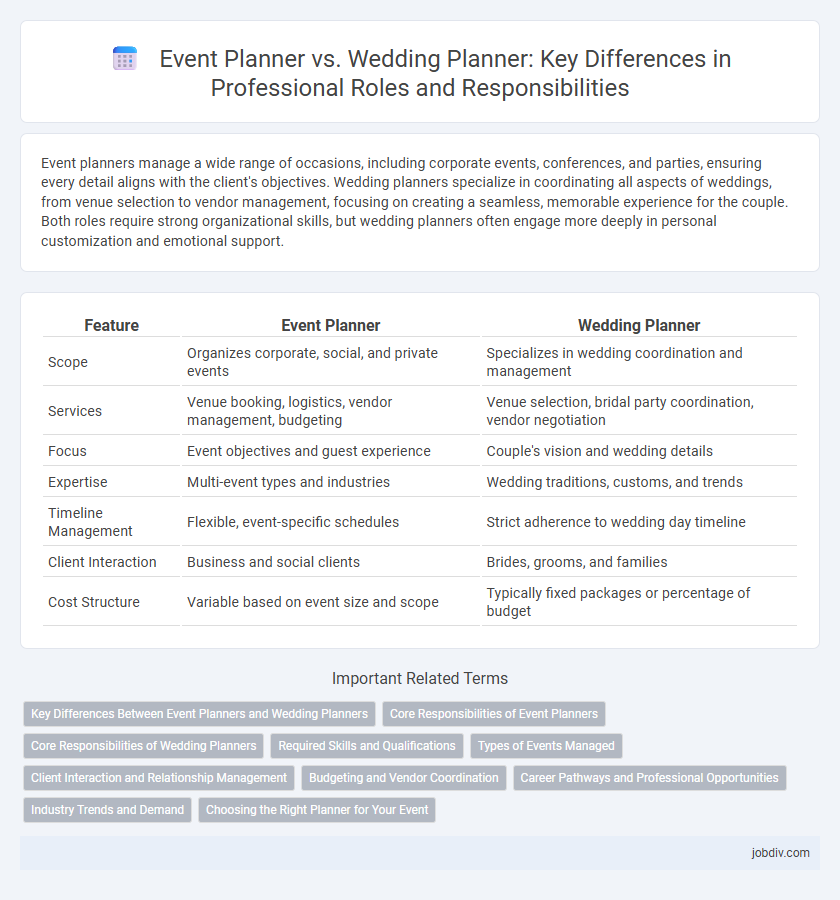Event planners manage a wide range of occasions, including corporate events, conferences, and parties, ensuring every detail aligns with the client's objectives. Wedding planners specialize in coordinating all aspects of weddings, from venue selection to vendor management, focusing on creating a seamless, memorable experience for the couple. Both roles require strong organizational skills, but wedding planners often engage more deeply in personal customization and emotional support.
Table of Comparison
| Feature | Event Planner | Wedding Planner |
|---|---|---|
| Scope | Organizes corporate, social, and private events | Specializes in wedding coordination and management |
| Services | Venue booking, logistics, vendor management, budgeting | Venue selection, bridal party coordination, vendor negotiation |
| Focus | Event objectives and guest experience | Couple's vision and wedding details |
| Expertise | Multi-event types and industries | Wedding traditions, customs, and trends |
| Timeline Management | Flexible, event-specific schedules | Strict adherence to wedding day timeline |
| Client Interaction | Business and social clients | Brides, grooms, and families |
| Cost Structure | Variable based on event size and scope | Typically fixed packages or percentage of budget |
Key Differences Between Event Planners and Wedding Planners
Event planners manage a wide array of events including corporate meetings, conferences, and social gatherings, focusing on logistics, venue selection, and vendor coordination to meet diverse client needs. Wedding planners specialize exclusively in weddings, emphasizing personalized design, bridal party coordination, and emotional support during the planning and execution of the ceremony and reception. The key difference lies in the scope and emotional significance; event planners handle multifunctional projects with varied objectives, whereas wedding planners concentrate on creating a culturally and personally meaningful experience.
Core Responsibilities of Event Planners
Event planners coordinate a wide range of occasions, including corporate meetings, conferences, and social gatherings, managing logistics such as venue selection, vendor negotiations, and budget oversight. Their core responsibilities emphasize timeline creation, guest management, and risk assessment to ensure seamless event execution. Unlike wedding planners who specialize solely in matrimonial ceremonies, event planners possess versatile skills adaptable to diverse event types and client objectives.
Core Responsibilities of Wedding Planners
Wedding planners specialize in coordinating all aspects of a wedding, including venue selection, vendor management, and day-of event coordination to ensure a seamless celebration. Their core responsibilities encompass budget creation, timeline development, and managing guest logistics to align with the couple's vision and preferences. Expertise in design consultation and crisis management is essential for handling unforeseen challenges and creating a memorable, personalized wedding experience.
Required Skills and Qualifications
Event planners require strong organizational skills, budget management expertise, and the ability to coordinate diverse vendors and logistics for various event types, often necessitating a background in hospitality or business management. Wedding planners specialize in personalized client communication, creative design, and detailed knowledge of wedding traditions, with certifications such as Certified Wedding Planner (CWP) enhancing credibility. Both roles demand excellent problem-solving skills, attention to detail, and proficiency in contract negotiation to ensure seamless event execution.
Types of Events Managed
Event planners specialize in coordinating a wide range of events such as corporate conferences, trade shows, product launches, and social gatherings. Wedding planners focus exclusively on managing wedding ceremonies and receptions, including vendor coordination, venue selection, and timeline management. Both roles require expertise in logistics and client communication but differ significantly in the types of events they manage.
Client Interaction and Relationship Management
Event planners excel at managing diverse client interactions across corporate, social, and public events, requiring versatile communication skills to tailor experiences to varied audiences. Wedding planners focus intensively on personalized client relationships, often collaborating closely with couples to navigate emotional dynamics and detailed preferences, ensuring a deeply customized celebration. Both roles demand strong relationship management, but wedding planners prioritize sustained emotional support and trust-building throughout the planning process.
Budgeting and Vendor Coordination
Event planners excel in comprehensive budgeting by allocating funds across multiple service areas and managing vendor contracts for diverse event types, ensuring cost-efficiency and timely delivery. Wedding planners specialize in detailed budget breakdowns for ceremonies and receptions, coordinating with specific vendors like florists, caterers, and photographers to create personalized experiences within financial constraints. Both professionals utilize advanced project management tools to track expenses and vendor timelines, optimizing resource allocation and minimizing budget overruns.
Career Pathways and Professional Opportunities
Event planners specialize in coordinating diverse events such as corporate meetings, conferences, and social gatherings, offering career opportunities in hospitality, marketing, and nonprofit sectors. Wedding planners focus exclusively on managing wedding logistics, vendor coordination, and client consultations, often working with venues, bridal boutiques, and specialized event companies. Both career paths demand strong organizational skills and client management but differ in industry specialization and potential for niche market expertise.
Industry Trends and Demand
The event planning industry is experiencing significant growth, with demand expanding beyond traditional weddings to corporate events, conferences, and social gatherings, reflecting broader market trends favoring personalized and experiential events. Wedding planners remain highly sought after due to the specialization required in coordinating intricate ceremonies, yet event planners with versatile skill sets attract clients seeking multi-format event solutions. Market analysis indicates that technological integration, sustainability initiatives, and hybrid event capabilities are key drivers shaping the evolving roles and increased demand for both event and wedding planners.
Choosing the Right Planner for Your Event
Choosing the right planner depends on the event's scale and specificity; an event planner oversees diverse functions including corporate events, conferences, and large social gatherings, while a wedding planner specializes exclusively in weddings, managing timelines, vendor negotiations, and personalized details. Evaluating experience in your event type, budget management skills, and the ability to coordinate multiple vendors effectively ensures a successful outcome. Clear communication and client rapport remain critical factors for selecting a planner who aligns with your vision and logistical needs.
Event Planner vs Wedding Planner Infographic

 jobdiv.com
jobdiv.com